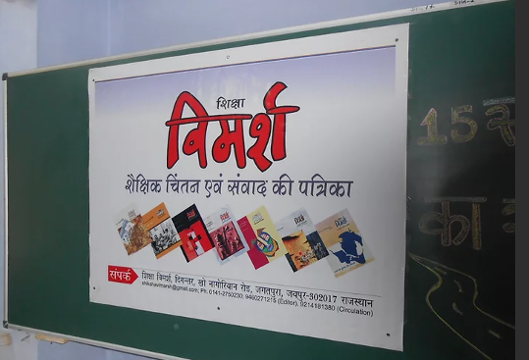'Shiksha Vimarsh’ is a bimonthly Hindi magazine published by Digantar. It seeks to inform and engage its reader in discourse on a wide spectrum of issues related to contemporary educational thought and practice, policies, problems, case studies, researches and book reviews. Over the last 15 years, Shiksha Vimarsh has brought out a range of issues covering: Maths pedagogy, History pedagogy, State of Children's Literature and special issues on Public-Private Partnership in Education, Right to Education and Sociology of Education.
A Special Issue on Digital Education
Digantar, in collaboration with IT for Change, is bringing out a special issue of Shiksha Vimarsh on digital technologies and education.
Due to the unexpectedly long school closures due to the COVID-19 pandemic, the role of digital technologies has increased significantly as private and public education systems have attempted to provide digital education to their students. It is increasingly believed by many that this presents an opportunity to change the legacy of physical school to an online mode or at least a blended mode, reducing the need for physical interactions. Digital ‘platforms’, which facilitate interactions among various actors (including consumers, producers, advertisers, service providers, and suppliers), harvest data from such interactions, and generate data-based intelligence for optimizing value are also becoming prominent in Education (such as BYJU’s or Google). This also has implications on teacher’s role and agency.
However, there are also views that see that digital technologies will worsen education inequities and cause a ‘digital partition’ of the country, apart from harming the quality of education. There is a need to bring in critical perspectives on this issue to build a deeper understanding of the benefits and harms from technology integration in education, and tease out principles that should underlie its adoption, which the special issue will attempt. The aim of technology integration must be to serve the aims of education, including that of building a just and equitable society, and this lens will be used to reflect on the submissions.
Scope
The issue will attempt an authentic exploration of the role of digital technologies in education at the levels of theory and practice, and also attempt to draw connections between the same. It will aim to build a dialogue among teachers and academicians working in education to contribute towards the building of understanding and a knowledge base on what role digital technologies play in achieving aims of education.
The thematic areas proposed for this issue include:
-
Historical perspective on digital technologies and education in India / global, including policy frameworks
-
Emergence and changing forms and modalities of digital technologies and its use in education in India
-
Ownership over digital technologies – PPP and other ICT in Education models
-
-
Larger implications on education, including aspects of access and equity
-
Power and hierarchy structures that inform design and implementation of digital technologies in education
-
Rural-Urban Dichotomy and its impacts and implications
-
Impact of technologies on existing power structures
-
-
Curriculum and material development through digital technologies, including open educational resources
-
Epistemological basis of development of digital teaching-learning material
-
-
Digital Technologies and Teacher Professional Development
-
Technological Pedagogical Content Knowledge (TPCK) framework, explored as a part of the larger ‘teacher-technology’ relationship.
-
-
Notes from the field – teachers experiences in working with digital technologies during the COVID-19 pandemic
-
Emerging trends – including personalized learning (artificial intelligence)
-
Book Review and case studies.
Article Submission
-
The length of articles can be between 2,000 to 5,000 words, and book reviews / case studies can be up to 2000 words.
-
Please send your articles latest by 31st January 2022
-
Submissions would be reviewed by the committee constituted by Digantar and IT for Change and selection done on the basis of identified criteria.
-
Please send your submissions to: Guru [at the rate of] itforchange [dot] net or kuldeep[dot]digantar[at the rate of] @gmail[dot]com
Hindi and English Versions
Shiksha Vimarsha is published in Hindi. For this special issue, through translation, an English version is also being considered. Article submissions can hence be in Hindi or in English.
Important
-
The editorial team will put in effort to ensure a broad and diverse set of articles and seek critical reflection in all articles, including those from the field.
-
The articles focusing on diverse geographies (urban-rural), curricular interventions, challenges of using digital technologies, future aspects of digital technologies, relationship of teacher and technology, and just technology systems are encouraged.
Guest Editor - Gurumurthy Kasinathan

